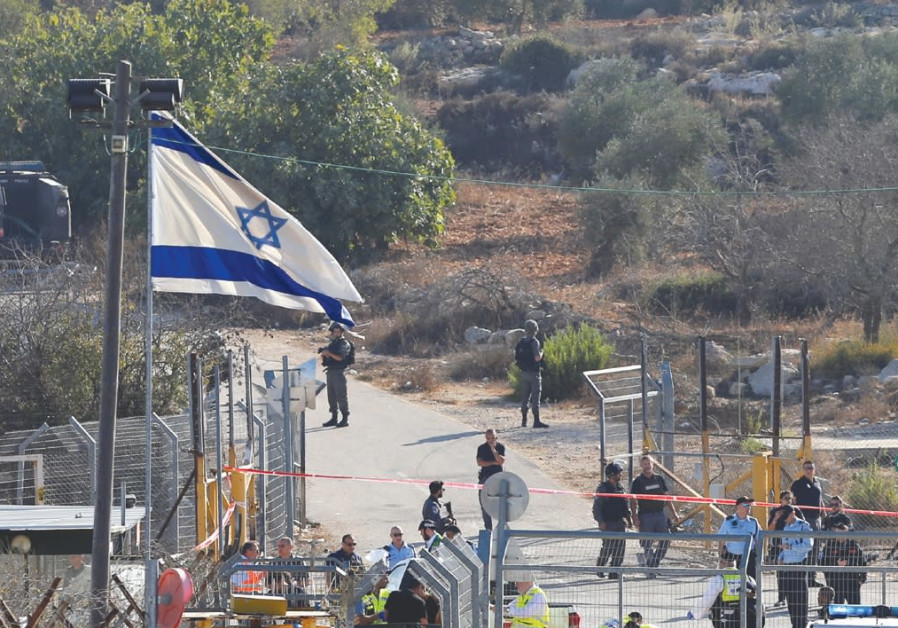Public Security Minister Gilad Erdan stated at the scene of the attack that the policy of providing Palestinians with permits should be examined, “but no hasty decisions should be made.”

Early on Tuesday morning, Nimr Mahmoud Ahmad al-Jamal, 37, gathered with dozens of other Palestinian day laborers at the entrance to the West Bank settlement of Har Adar, work permit in hand and a pistol hidden under his shirt.
Arousing the suspicion of the guards when he lingered at the eastern entrance to the settlement, he pulled out the pistol and opened fire, killing a border policeman and two security guards before being shot and killed by security forces.
Police said Jamal, from the nearby village of Beit Surik, possessed a legal work permit, making him one of the few Palestinians with that coveted document to carry out a deadly terrorist attack in recent years.
While Tuesday’s attack, which was praised by both Fatah and Hamas, was significant and deadly, the defense establishment, which has made preparations for increased violence during the High Holy Days, does not believe it signals the beginning of a new round of escalation of violence in the West Bank.
Nevertheless, the attack will likely cause the Shin Bet (Israel Security Agency) to reevaluate the vetting process of Palestinians who apply for work permits to work in West Bank settlements and throughout the rest of Israel.
Transportation and Intelligence Minister Israel Katz stated, “The fact that the terrorist exploited the entry of Palestinian workers into Israel in order to carry out an attack will have serious implications for the ability to employ Palestinians and ease their conditions of passage.”
Public Security Minister Gilad Erdan stated at the scene of the attack that the policy of providing Palestinians with permits should be examined, “but no hasty decisions should be made.”
The defense establishment has maintained that allowing thousands of Palestinians to work in Israel, including in Jewish communities in the West Bank, is in Israel’s best interest.
Echoing Erdan’s statement, Police Commissioner Roni Alsheikh cautioned that authorities are still evaluating the situation.
“We’re talking about the passage of laborers and Israeli society has needs of its own. Laborers are working with permits and the IDF itself considers it the chance of a normal life for Palestinians.
We need to be sure no rash judgments are made,” he said.
A senior IDF officer in the southern West Bank told The Jerusalem Post in a recent interview: “Not every Palestinian is a terrorist and so we want them to have normal lives. Palestinians working in Jewish communities in the West Bank are less likely to carry out an attack, but never say never,” he said.
According to the Shin Bet, Jamal had a history of domestic violence and had been experiencing significant personal and family problems.
His wife had fled to Jordan in recent weeks, leaving him with their four children.
While violence and terrorist attacks have drastically decreased since their peak in the winter of 2016, when there were almost daily attacks, the defense establishment has grown worried about the erratic and unpredictable behavior of Palestinian Authority President Mahmoud Abbas.
In late July, Abbas suspended security cooperation with Israel after metal detectors were placed on the Temple Mount complex in Jerusalem’s Old City, following an attack on the complex that left two Israeli policemen dead.
The suspension of that cooperation has left Israel concerned as it still has not resumed and Palestinian security forces stopped many attacks in the West Bank since the recent wave of terrorism broke out.
In addition to the work of the Palestinian security forces, the IDF has stated that thousands of attacks have been thwarted due to intelligence gathering, including by increased monitoring of social media activity, arresting individuals who express their desire to set out on attacks or who attempt to inspire others to do so on social networks like Facebook.
Similar to the July attack in the West Bank settlement of Halamish that left three Israeli civilians dead, Jamal had reached out to his wife on Facebook shortly before the attack, asking for forgiveness and asking her to take care of their children as he understood the gravity of what he was about to do.
Since October 2015, Palestinian youths have stabbed, run over and shot Israeli soldiers and civilians, including some tourists, in a wave of violence in the West Bank and throughout Israel that has left at least 295 Palestinians and Arab Israelis, 50 non-Arab Israelis, two Americans, two Jordanians, an Eritrean, a Sudanese and a Briton, according to Agence France-Presse.
As reported by The Jerusalem Post
